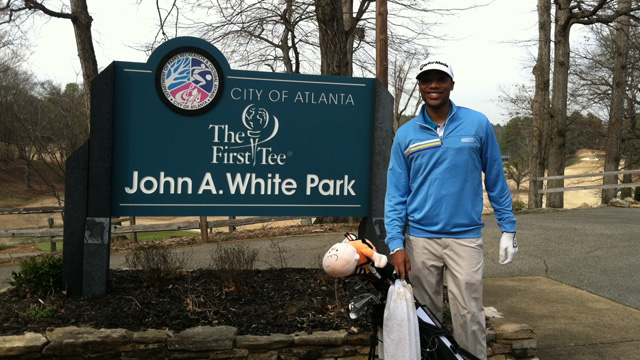NEWS
Opportunities Gained, Opportunities Given

As part of the celebration of Black History Month, PGA.com is proud to profile one of the bright young stars of the PGA of America - Christopher Hawkins. Hawkins' story is one about opportunity, appreciation and determination. It is also one about the future of golf -- where the game can grow, can thrive and make a difference if the industry and the audience is willing for it to happen.
If someone were to describe a young golf pro to you -- young and enthusiastic, excellent player and earnest instructor, elite prep school and private college graduate, has played at some of the finest courses in the world and can easily discuss virtually any topic of golf history -- it's probably pretty easy for you to picture a pro you know who could be the subject. And they probably look nothing like Christopher Hawkins.
Christopher Hawkins is one of a small number of African-American PGA Professionals in the United States.
At 26 years old and a shade over 5'11" ("6 feet in new spikes," he laughs), Hawkins doesn't cut an imposing physical presence, but he often stands out in golf crowds -- for two reasons.
"Well, I am black," he smiles. "Always have been, always will be. But I can play some golf, too. And I've found that if you can get your ball around, a lot of people dismiss or overcome any preconceived notions they may have had because good golf, or a good golf partner, trumps a lot of negative stereotypes out there."
Hawkins may be indicative of the future of golf. Not because of his race, not because of his talent, but because his story shows the power of golf -- for a person, for a community and even for a generation.
Born and raised in Atlanta, Hawkins grew up in a predominately middle-class African-American neighborhood. At the age of eight, the woman who ran an after-school program in his neighborhood encouraged his participation in a program, at Sugar Creek Golf Course, run by a golf pro friend of hers. Hawkins enrolled and eventually migrated to John A White Park Golf Course to became a part of The First Tee of Atlanta. His parents ultimately enrolled him (and his brother) at Marist, an elite prep school in suburban Atlanta -- geographically, economically and demographically distant from his home neighborhood.
But despite a few questions from his friends at home and in the classroom, his acclimation was mostly seamless as he played on the golf team and, eventually, as a member of the first class of First Tee Scholars, Hawkins was able to attend Georgetown College in Georgetown, Ky. His skill and talent on the course served him well in many areas off of it.
"Golf has given me so much, it's really played a huge role in the opportunities and life that I've had," Hawkins states. "Playing golf has opened so many doors, but it's also taught me so many life skills. Every kid, I don't care what your background is, can learn and benefit from golf."
But Hawkins doesn't shy away from the significance of his story and his community. "Of course I'm going to feel a responsibility to give back. And now, I'm back where it all started for me, helping kids that were in similar situations to where I was at that age," he said. "They don't just hear what golf can do, they actually see it with me. There's a payout for hard work, discipline, persistence."
Hawkins is back at John A. White Park Golf Course in Atlanta, the home of The First Tee of Atlanta.
"Maybe it's not the most prestigious (name) course in Georgia, but our nine-hole layout is tremendous, our conditions are typically very good and it's an outstanding value," he said. "The golf ball flies the same here as it flies at Augusta or Pinehurst or Pebble Beach. The holes are the same size. People that play here love it and the kids that learn here will be able to take that game anywhere in the world."
And therein lies the real power and influence of golf according to Hawkins -- and the real potential it has for growing the game.
"My race is an issue because of the numbers; there's not that many African-Americans in golf," Hawkins states. "But in truth, the sport of golf is colorblind. The culture of golf is where there have been problems. But the golf ball doesn't know or care. You aren't a "great black golfer," you're a great golfer. Period. When I play in a tournament, I might get an extra look because I'm the only African-American in the field, but I promise you, no one cares once the tee is in the ground and all that matters is the score put up.
"I'm very proud of my race and my community. But I'm also proud of the work and practice I've put into my golf career. It'd be great if there comes a time when it's not even noticed when the club pro is black, or the name on top of the leaderboard is black. I hope it happens soon. But I don't play golf, teach golf or promote golf to be different. I do it because I love it. Because I believe in it."
If golf is to grow, it will need to reach new audiences. The health of the game and the industry depends on more people playing and those already playing getting out a little bit more. Hawkins, by his trade, by his race and by his example is playing a significant role in making all three things happen. And that is going to be a great story -- not for just him or his community or just African-Americans, but for all golfers everywhere.
You can follow Christopher Hawkins on Twitter at @ChrisHawkinsPGA
